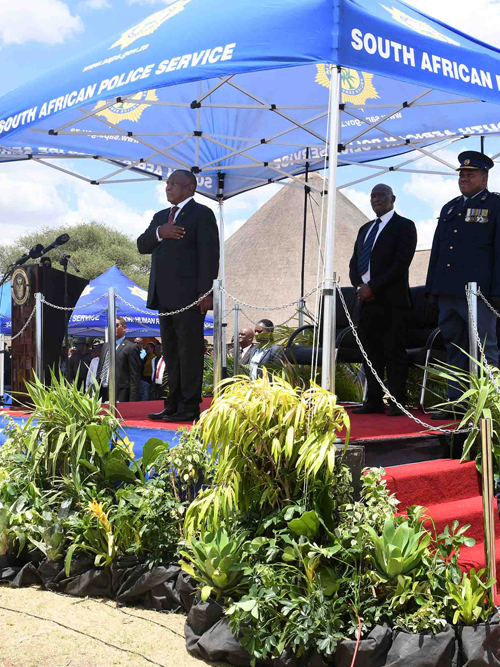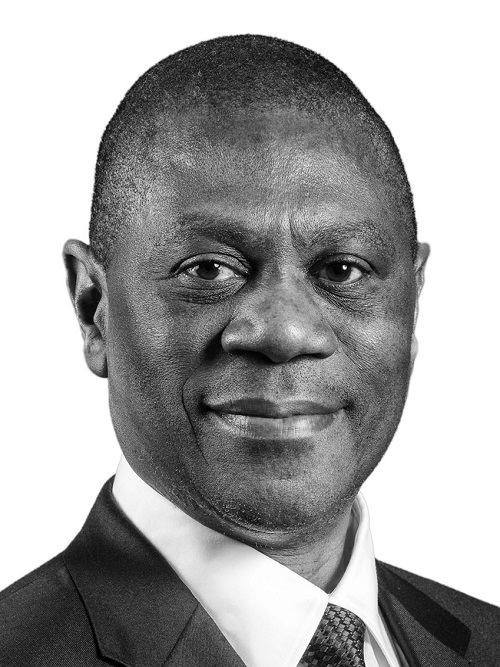Programme Director,
Minister of Police, Gen Bheki Cele,
Premier of the Northern Cape, Mr Zamani Saul,
MEC for Transport, Safety and Liaison in the Northern Cape, Ms Nomandla Bloem,
SAPS National Commissioner, Gen Fannie Masemola,
SAPS senior management, commanders and personnel,
SAPS members,
Representatives of SAPU and POPCRU,
Our guests of honour, the trainee constables on parade,
Guests,
Ladies and Gentlemen,
Good Morning.
It gives me the greatest pleasure to be here today to witness the passing out of our new recruits.
Having reached this milestone, you will now join the ranks of one of the most noble and honourable of professions, serving your community and the South African people as members of the South African Police Service.
It is not an easy road you have chosen.
Being a policeman or policewoman involves gruelling training, many hours spent away from friends and family and hard work in difficult and sometimes dangerous conditions.
This profession puts you at the frontline of service to our citizens, who come to you for help, and in the frontline in the fight against crime.
And yet it is a path you have chosen. The path of the bravest of the brave, the path of service and dedication. For this, we thank you and we salute you.
Our country is under siege from criminals. Crime is wreaking havoc in communities, destroying lives and tearing families apart.
Crime is undermining our economy, affecting small and large businesses alike, and holding back a sustainable economic recovery.
We are tired of crime. We are tired of criminals operating with impunity.
We are tired of the abuse and violence directed at women, children and other vulnerable groups.
We are tired of the rule of law being undermined.
Sikwanele. Genoeg is genoeg. Enough is enough.
We have recruited and trained you as part of a new front in the fight against crime.
In February this year, during the State of the Nation Address, I said that the SAPS will train 10,000 new recruits this year to bolster the 10,000 recruits that were trained in 2022.
As the latest intake, these trainees will contribute to government’s visible policing efforts and strengthen the capacity of the SAPS.
This week there will be passing-out parades at various sites across the country for the first cohort of recruits, with the second cohort scheduled to be inducted early in 2024.
Our new constables will be deployed to various police stations and also to specialised units such as Public Order Policing, Visible Policing, and the Family Violence, Child Protection and Sexual Offences units.
Among their first tasks will be to strengthen the country-wide effort to ensure that South Africans are safe and secure during this festive season.
Let me take this opportunity to congratulate those trainees who have been recognised for their outstanding performance in Street Survival, Law, Physical Training and Drill.
A strong, capacitated and well-resourced South African Police Service is critical in the fight against crime.
Despite the challenges it faces, the SAPS has made significant inroads in recent months.
Operation Shanela, launched in May this year, has undertaken high-density operations across the country that have resulted in over 250,000 arrests, the seizure of over 3,200 firearms and the recovery of more than 1,700 stolen vehicles.
The police have made progress in tackling crimes like cash in transit heists, drug smuggling, illegal mining and damage to critical infrastructure.
Working together with the NPA, the police have secured 247 life sentences for 187 perpetrators of gender-based violence since the beginning of this financial year.
This is progress, but much more needs to be done.
The trainees who are passing out today therefore carry an important responsibility.
Police members are the first responders. Police members are first point of contact with victims of crime. Police stations are the places people go first when a crime has been committed. Suspects who have been apprehended or arrested are taken away in police vans or detained at police stations.
This comes with a great and heavy responsibility, to serve with courtesy, dignity and respect, to embody the finest values of the public service, and to respect the rights and human dignity of all.
It is important that we restore and maintain people’s faith and confidence in the SAPS. We expect you to serve our people with respect and to do everything within your means to earn their trust.
We thank you for taking up the call to serve your country.
You have shown your willingness to subject yourselves to the discipline and hard work that comes with being a member of the SAPS.
This is just the beginning of your journey. Ahead of you are years of dedicated service.
I am confident that you will perform your duties to the best of your ability, respecting the laws of the land and upholding the Constitution.
Wear your uniform with pride, be ever mindful of the SAPS Code of Conduct, and keep yourselves and each other safe.
I express my sincere gratitude to the Commanders of SANDF 3 Infantry Battalion Academy for their leadership and unwavering support throughout the training period.
To the parents, family members and friends of the trainees, your support, sacrifice and inspiration have been invaluable.
To all the trainee constables passing out here and in other parts of the country: welcome to the SAPS and congratulations.
I thank you.







